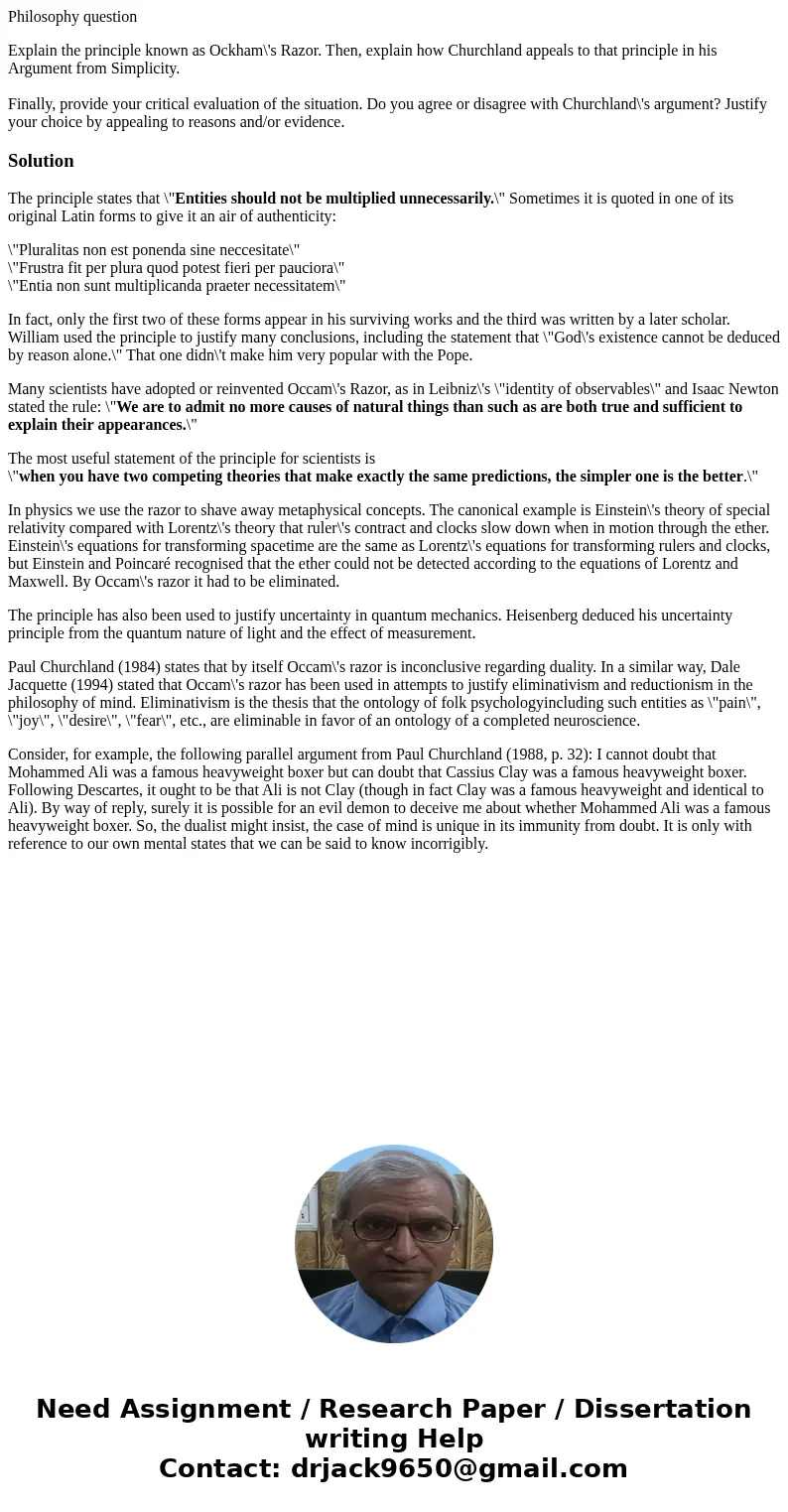Philosophy question Explain the principle known as Ockhams R
Philosophy question
Explain the principle known as Ockham\'s Razor. Then, explain how Churchland appeals to that principle in his Argument from Simplicity.
Finally, provide your critical evaluation of the situation. Do you agree or disagree with Churchland\'s argument? Justify your choice by appealing to reasons and/or evidence.
Solution
The principle states that \"Entities should not be multiplied unnecessarily.\" Sometimes it is quoted in one of its original Latin forms to give it an air of authenticity:
\"Pluralitas non est ponenda sine neccesitate\"
\"Frustra fit per plura quod potest fieri per pauciora\"
\"Entia non sunt multiplicanda praeter necessitatem\"
In fact, only the first two of these forms appear in his surviving works and the third was written by a later scholar. William used the principle to justify many conclusions, including the statement that \"God\'s existence cannot be deduced by reason alone.\" That one didn\'t make him very popular with the Pope.
Many scientists have adopted or reinvented Occam\'s Razor, as in Leibniz\'s \"identity of observables\" and Isaac Newton stated the rule: \"We are to admit no more causes of natural things than such as are both true and sufficient to explain their appearances.\"
The most useful statement of the principle for scientists is
\"when you have two competing theories that make exactly the same predictions, the simpler one is the better.\"
In physics we use the razor to shave away metaphysical concepts. The canonical example is Einstein\'s theory of special relativity compared with Lorentz\'s theory that ruler\'s contract and clocks slow down when in motion through the ether. Einstein\'s equations for transforming spacetime are the same as Lorentz\'s equations for transforming rulers and clocks, but Einstein and Poincaré recognised that the ether could not be detected according to the equations of Lorentz and Maxwell. By Occam\'s razor it had to be eliminated.
The principle has also been used to justify uncertainty in quantum mechanics. Heisenberg deduced his uncertainty principle from the quantum nature of light and the effect of measurement.
Paul Churchland (1984) states that by itself Occam\'s razor is inconclusive regarding duality. In a similar way, Dale Jacquette (1994) stated that Occam\'s razor has been used in attempts to justify eliminativism and reductionism in the philosophy of mind. Eliminativism is the thesis that the ontology of folk psychologyincluding such entities as \"pain\", \"joy\", \"desire\", \"fear\", etc., are eliminable in favor of an ontology of a completed neuroscience.
Consider, for example, the following parallel argument from Paul Churchland (1988, p. 32): I cannot doubt that Mohammed Ali was a famous heavyweight boxer but can doubt that Cassius Clay was a famous heavyweight boxer. Following Descartes, it ought to be that Ali is not Clay (though in fact Clay was a famous heavyweight and identical to Ali). By way of reply, surely it is possible for an evil demon to deceive me about whether Mohammed Ali was a famous heavyweight boxer. So, the dualist might insist, the case of mind is unique in its immunity from doubt. It is only with reference to our own mental states that we can be said to know incorrigibly.

 Homework Sourse
Homework Sourse